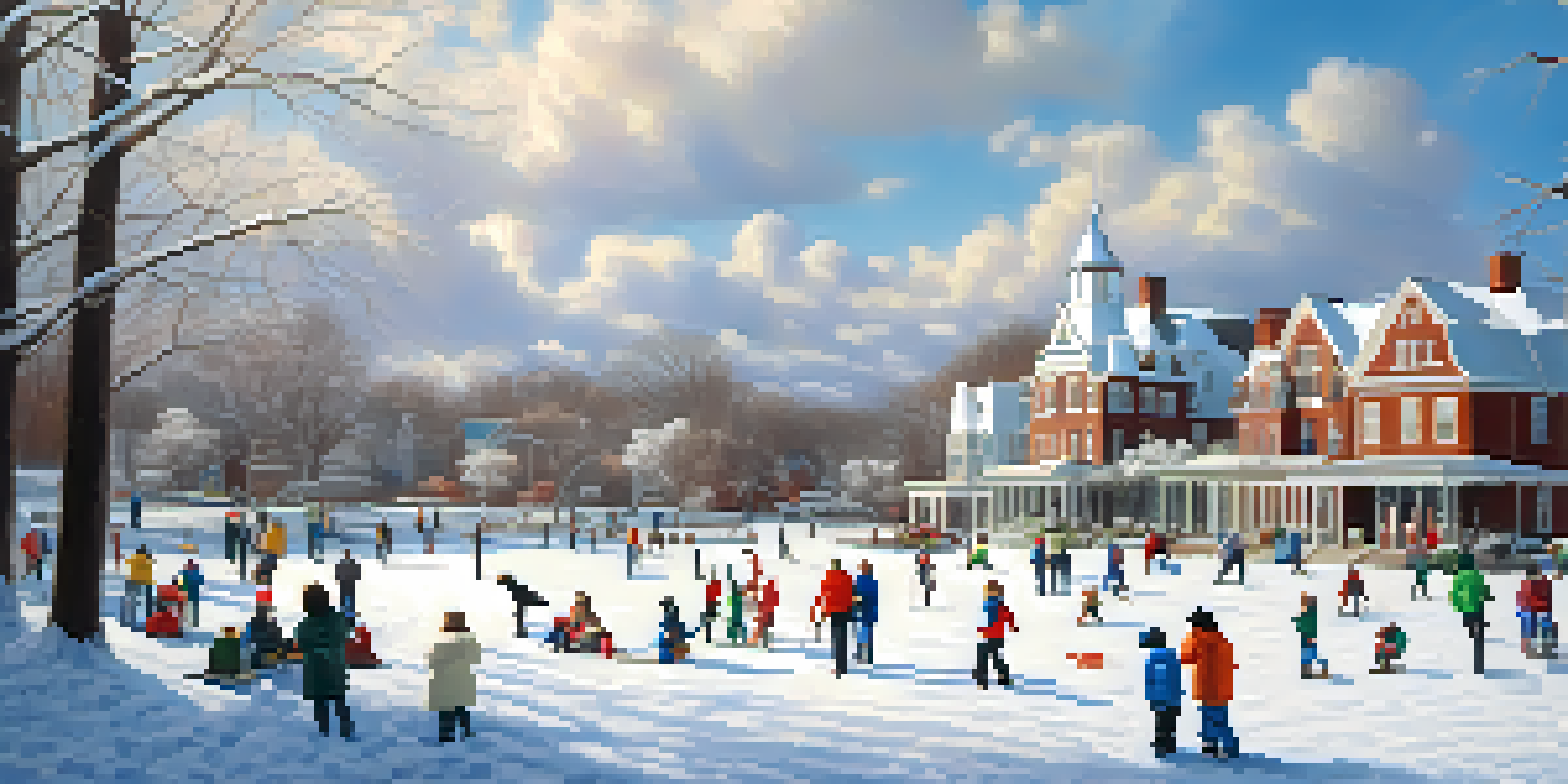The History of Winter Weather in Atlanta: A Brief Overview

Introduction: Atlanta's Unique Winter Climate
Atlanta, often known for its warm Southern hospitality, has a winter weather history that surprises many. While not typically associated with heavy snowfall, the city has seen its share of winter storms that have left a mark on its culture and infrastructure. Understanding this unique climate helps residents and visitors alike prepare for those rare but impactful winter events.
In the midst of winter, I found there was, within me, an invincible summer.
The city's geography plays a crucial role in its winter weather patterns. With its location in the southeastern United States, Atlanta is influenced by both the Gulf of Mexico and the Appalachian Mountains. This blend of factors creates a dynamic atmosphere where winter weather can be unpredictable, sometimes leading to significant snowfall or ice.
As we delve into Atlanta's winter history, we'll uncover notable snow events, the community's response, and how these occurrences shape the city today. So, grab a warm drink and join me on this journey through the chilly chapters of Atlanta's past.
Early Winter Weather Events: A Historical Perspective
The earliest recorded winter weather events in Atlanta date back to the late 1800s. Residents experienced sporadic snowfalls, but these events were far less frequent than in northern cities. The historical records reveal that the city had a few significant snowfalls that caught locals by surprise, marking the beginning of winter weather awareness.

One notable event occurred in 1899, when a severe cold snap swept through the South, bringing snow and ice to Atlanta. This event was so impactful that it led to frozen pipes and disrupted daily life, showcasing how unprepared the city was for such harsh conditions. The aftermath of the storm prompted discussions about better preparedness for future winter weather.
Atlanta's Winter Climate Surprises
Despite its Southern reputation, Atlanta experiences unpredictable winter weather that has significantly impacted its culture and infrastructure.
These early experiences laid the groundwork for how Atlanta would approach winter weather in the years to come. They also served as reminders that even the South is not immune to the whims of winter, shaping the collective memory of its residents.
The Great Blizzard of 1993: A Turning Point
Fast forward to March 1993, when Atlanta experienced what is often referred to as the Great Blizzard. This storm brought with it over a foot of snow in some areas, paralyzing the city and catching many residents off guard. The blizzard was a stark reminder of how quickly winter weather can disrupt life in Atlanta, leading to school closures and traffic chaos.
Winter is not a season, it's a celebration.
In the wake of the blizzard, the city took significant steps to improve its winter preparedness. Local authorities began investing in snow removal equipment and developing response plans for future storms. This event marked a turning point in how Atlanta viewed and dealt with winter weather, transforming the city’s approach to snow and ice management.
The Great Blizzard of 1993 remains a poignant memory for many Atlanta residents, often recounted in stories of epic snowball fights and impromptu snow days. Its impact is still felt today, as it shaped the community's understanding of winter weather in the region.
Ice Storms: A Common Winter Challenge
While snow garners the most attention, ice storms have been a recurring winter challenge for Atlanta. These storms often leave behind treacherous road conditions and power outages, leading to significant disruptions. The combination of freezing rain and warmer temperatures creates a dangerous mix, making travel perilous and affecting daily life.
One of the most impactful ice storms occurred in January 2014, when the city faced a sudden freeze that caught many off guard. The storm led to gridlocked traffic and widespread power outages, illustrating how unpreparedness can exacerbate winter weather challenges. This event brought attention to the need for better communication and response strategies.
Lessons from Past Winter Events
Historical winter storms, particularly the Great Blizzard of 1993, prompted Atlanta to improve its preparedness and response strategies.
As a result, Atlanta has learned to prioritize ice storm preparedness, encouraging residents to stay informed and have emergency kits ready. The lessons learned from these storms have contributed to a more resilient community, one that is better equipped to handle the unpredictability of winter weather.
Snow Days and Their Cultural Impact
For many Atlanta residents, snow days are a cherished aspect of winter, transforming the city into a winter wonderland. When snow blankets the streets, schools close, and families take to the outdoors for snowball fights and sledding. These moments foster community bonding and create lasting memories, even if the snow doesn't stick around for long.
The cultural significance of snow days in Atlanta extends beyond just recreation. They serve as a reminder of the city's history with winter weather and how it brings people together. Whether it’s sharing stories of past snow events or enjoying hot cocoa with neighbors, these days create a sense of unity amidst the cold.
Moreover, social media often lights up with photos and updates during snow days, showcasing the city's playful spirit. This blend of nostalgia and community reinforces the idea that while winter weather may disrupt daily life, it also has the power to create moments of joy and togetherness.
Preparing for Winter: Lessons Learned
Through its winter weather history, Atlanta has learned valuable lessons about preparedness and resilience. Each snowstorm or ice event brings new insights into how to better equip the city and its residents for the challenges ahead. This proactive approach has led to improved infrastructure and community awareness, making Atlanta a more resilient city during winter.
Local authorities now emphasize the importance of emergency planning and communication. Residents are encouraged to stay informed through weather updates and to have winter preparedness kits ready. This shift in mindset reflects a growing recognition that while winter weather can be unpredictable, being prepared can make all the difference.
The Future of Winter in Atlanta
As climate change alters weather patterns, Atlanta must adapt to potentially more frequent ice storms while fostering community resilience.
As Atlanta continues to experience winter weather events, the lessons learned from the past will guide its future. The city stands as a testament to how a community can adapt and grow stronger in the face of challenges, ensuring that winter weather is met with readiness and resilience.
Looking Ahead: The Future of Winter in Atlanta
As climate change continues to impact weather patterns, Atlanta's winter weather may undergo further changes. Scientists predict that while the frequency of snow may decrease, ice storms could become more common. This evolving landscape poses new challenges for the city and its residents, requiring ongoing adaptation and preparedness.
The future of winter in Atlanta will likely involve a combination of embracing the joys of winter and being ready for its challenges. Community engagement and education will play a crucial role in helping residents navigate these changes. By fostering a culture of preparedness, Atlanta can continue to thrive despite the unpredictability of winter weather.

Ultimately, Atlanta's winter weather history serves as a reminder that while the seasons may change, the spirit of its people remains resilient. As the city looks ahead, it will carry with it the lessons of the past, ready to face whatever winter may bring.